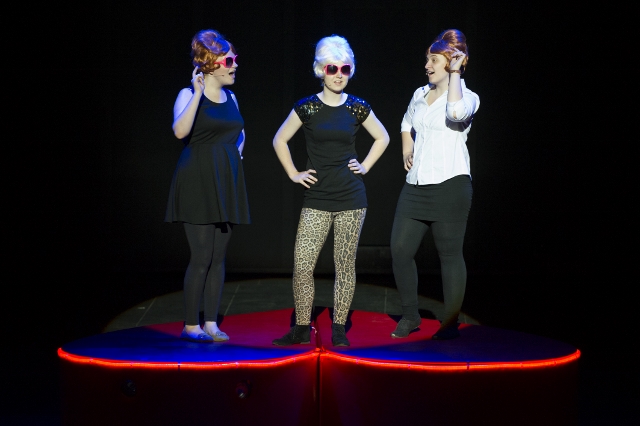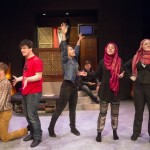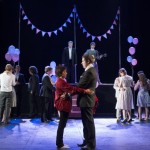Connections is the National Theatre’s annual festival of new plays for youth theatres and schools. They apply to take part, and if accepted, choose one of the ten plays commissioned for the programme. The 2013/14 playwrights were Deborah Bruce, Matt Hartley, Sam Holcroft, Dafydd James, Catherine Johnson, Sabrina Mahfouz, Pauline McLynn, Luke Norris, Evan Placey and Simon Vinnicombe.
The works are diverse, covering a wide range of subjects from the gulf between young and old, nationalism, football and the Egyptian revolution.
Young actors then set about preparing their play for performance, their experience mirroring that of a company producing a new play in any theatre. They create marketing campaigns, design sets and costumes, operate lighting and sound boards, and stage-manage their performances.
The programme’s reach is vast, involving 230 school and youth theatre companies, 5,000 young people, 684 performances and 25,000 audience members. Plays are premiered across the UK in 26 leading regional theatres, culminating in a final Festival which sees ten companies performing their productions at the National on London’s South Bank. And so, on a cool summer night in July, the Olivier Theatre thronged with young people, their teachers and proud family members. For the playwrights themselves, NT Connections is a powerful experience.
Mamma Mia! writer Catherine Johnson, whose moving play A Letter to Lacey was performed by John Cabot Academy from Kingswood, Bristol, said: ‘I’ve seen the play several times across the country and saw this production at the Bristol Old Vic. The productions have all been very different, which is fascinating.
‘I suppose the biggest insight is that it works nationally. I am from Bristol and this group is from Bristol so when I hear it, the words sound like they do in my head. But when I heard other groups going through the lines it achieved what I hoped it would – telling a story that makes sense to all young people.’
For Catherine, the process of becoming an NT Connections writer was slightly different as she did not originally want this play put forward. She explains: ‘I had worked with The Meriton, a school for teen mums in Bristol – they approached me to ask if I would write a monologue around partner abuse so they could work with the girls around the theme. The head teacher felt it would be something her girls would respond to and they did. I workshopped it with the girls and then Anthony Banks saw it and asked if I would consider adapting it into a Connections play which I wasn’t keen to do because it would have been so different. He had to twist my arm! It’s a very particular monologue but it works.’
In the play, Lacey writes an email to someone she’s never met – the new girlfriend of her abusive ex-boyfriend, Reece. Through the letter we follow their first meeting and their final showdown. As Reece exerts his violent influence – controlling, declaring love, hitting her – the complex issues are revealed. Lacey says: ‘The way he messed with my head was worse than hitting me’ – and the breakdown of her other relationships highlights the affect abuse has on family and friends.’
Catherine said: ‘A Letter to Lacey is a play with songs. I invited each group to write their music – I just gave a rough guide to the genre of the song. What is wonderful is that although it is quite a hard play about abuse, the music brings theatricality to it and each group, by owning the songs, have put their own stamp on the play.’
John Cabot Academy wrote some strong pieces – often upbeat – that brought the tough issues into sharp relief and were performed with confidence beyond their years. Catherine said: ‘I never think about writing for young actors because that has never been a problem. With more experienced actors you can see what they’re doing. With younger actors, they’re giving it to you. They are bringing something new to the stage because they are closer to the subject matter.’
She adds: ‘As a writer, it’s you, your head and your laptop – but NT Connections gives you the chance to travel the country, meet kids who have done me the honour of doing my show and doing it proud, and talking to me about the experience.’
Evan Placey’s Pronoun is equally challenging – and explores the theme of transition through childhood sweethearts Josh and Isabella, who has become Dean. We watch how the decision affects those around him. Played with great comic timing, this young cast brought out the complex issues – betrayal, hurt and isolation.
As Dean says: ‘Maybe they’re not my friends; maybe they’re her friends.’
So where did the story come from? Evan says: ‘I’d been thinking about gender as a whole and specifically the lack of trans characters on stages full stop in British theatre. I wanted to write about a young trans person – I just had a nugget of an idea; I was getting angry about how trans stories were being depicted in the media – the idea we should be striving for tolerance.
‘I thought tolerance isn’t enough; Dean has a monologue and he says ‘tolerance is bullshit’. He doesn’t want to be tolerated, he wants to be loved. I wanted to write a play in which we embraced this person.’
The play was performed by Cornwall College and its complexities shone through in the slick production that used a big cast but really explored the internal conflict of the characters. Both Catherine and Evan believe writing for young people is it’s all about the story – and authenticity, as in any drama.
Catherine explains: ‘The initial challenge is to make it sound authentic. I haven’t been young for some time but I am surrounded by young people all the time – I have a daughter at home with lots of friends. So I hear young voices quite a lot. The initial thing is authenticity but it’s got to tell a good story, it’s got to be gripping, it’s got to make the audience get involved.’
Evan says: ‘You’ve got to work a tad harder to make it more engaging because most young people when they go to the theatre haven’t chosen to be there; they’ve been taken by someone. You have to make it what young people want to see, not what we think they want to see or what they should see…’
As for being part of NT Connections, he described it as ‘magical’: ‘It’s been wonderful to see how many different ways it has been interpreted; for example the performance by Cornwall College, have cast four different actors as James Dean. In all the productions, the story of this young transgender man has come through and the comedy has come through. ‘What was amazing none of the young people had ever been to the National and the first time they’re here, they are performing here and that’s what it’s all about. It’s the National Theatre, for the nation. It’s been pretty magical.’
To see the plays chosen for 2014/2015 programme visit http:// connections.nationaltheatre.org.uk/plays. All ten plays in the 2013/14 season are published by Methuen.
Images by Richard Hubert Smith





